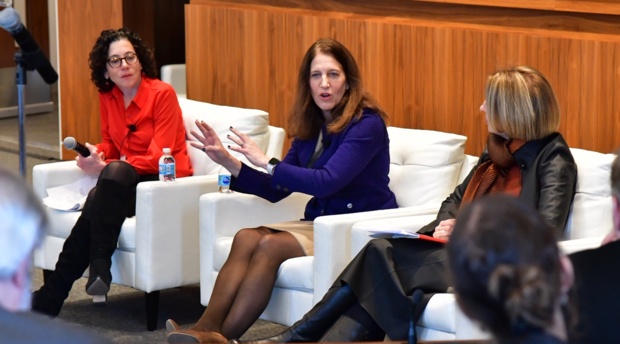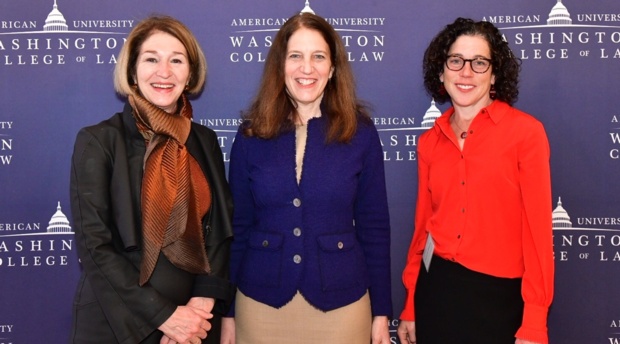AUWCL Tech, Law, and Security Program and Technology Collaborative “Future Tense” Launch Free Speech Project
Feb. 25, 2020

On Monday, Feb. 24, American University Washington College of Law’s new Tech, Law, and Security Program (TLS), in partnership with technology collaborative Future Tense, launched a collaborative year-long project that seeks to analyze the current state, and future prospects, of free speech in the digital age.
“We [have] core unresolved questions about how to define and how to protect free speech, while also addressing the very real world harms that speech perpetuates—and so, welcome to the Free Speech Project,” Professor and Program Director Jennifer Daskal said of the partnership with Future Tense.
Over the course of the next 10-12 months, the project with examine questions such as whether there should be a fundamental re-evaluation of traditional (and close to absolutist) American free speech tenets; what are the roles and responsibilities of tech companies that mediate our speech online; and who decides what people can and cannot say on the internet.
The launch event featured two panel discussions – “Obnoxious Speech Before the Age of Twitter” and “Dare to Speak: Defending Free Speech for All” – along with a conversation between Daskal, American University President Sylvia Mathews Burwell, and New America CEO Anne-Marie Slaughter, author of The Chessboard and the Web: Strategies of Connection in a Networked World.
Burwell said the values the U.S. has been known for historically in regard to free speech – respect, partnership, integrity – are integral in shaping our relationships with others, including other countries.
“These values have been damaged, and I think that makes it even harder for us to argue the values we hold within our own country are things we can press on others,” she said. “The basic values that our nation is founded on are good ones that we want to share, that we want to promote. Even if they are aspirational, in the sense that we’re not living them, it’s still important for us to think through what [values] we want to promote and keep aspiring to do better.”

“It was just a decade ago that Secretary of State Hillary Clinton gave her first big internet freedom speech at the Newseum, proclaiming the virtues of an ubiquitous open internet, along with the assumption that an open internet would bring new freedoms and the democratizing, empowering values traditionally associated with free speech,” Daskal said. “While the internet has undoubtedly connected people across the globe, it has not always made us free, and some of its effects have been extraordinarily damaging – hate, crime, terrorism, malicious election interference, among many other disturbing actions.”
While Slaughter said she still believes in the power of the internet to be used positively, specifically the ability to access information and communicate globally, she fears the negative influence it can have over democracy.
“It’s not that we weren’t aware bad things could happen on the internet, but the balance of bad to good was so clearly in favor of good. Whereas now…I am genuinely afraid for our democracy. The sense that that we’re in the Sorcerer’s Apprentice – that these machines we’ve created are really beyond our control is increasingly pervasive.”
Future Tense is a partnership of Slate, think tank New America, and Arizona State University that examines emerging technologies, public policy, and society.
Click here to watch the full event. Learn more about the Tech, Law, and Security Program here.